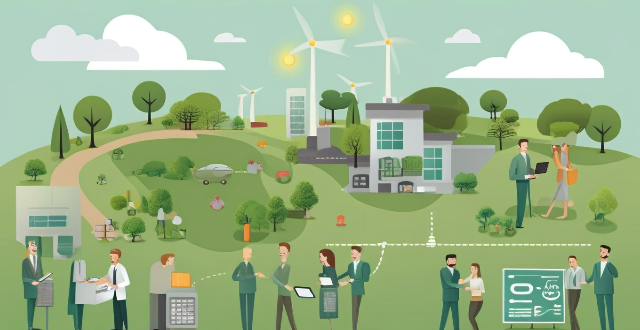The role of renewable energies in the energy transition process is to help decarbonize the power sector, promote sustainability, provide economic benefits, improve energy security, and enhance public health. Renewable sources like solar, wind, hydropower, and geothermal emit little to no greenhouse gases during operation, making them crucial for reducing carbon emissions associated with electricity generation. These sources are also sustainable as they are replenished naturally and do not deplete over time. Investing in renewable energies can lead to job creation, technological innovation, and cost savings in the long run. By diversifying energy sources, countries can reduce their dependence on imported fuels and enhance their energy security. Additionally, renewable energies have lower environmental impacts than fossil fuels, leading to improved air quality and public health benefits.

The Role of Renewable Energies in the Energy Transition Process
The energy transition process refers to the shift from traditional fossil fuels to renewable energy sources. This transition is crucial for mitigating climate change, reducing greenhouse gas emissions, and ensuring a sustainable future for generations to come. In this context, renewable energies play a vital role in shaping the energy landscape of the future.
Key Points:
- Decarbonization: Renewable energies help in decarbonizing the power sector by reducing reliance on carbon-intensive fossil fuels.
- Sustainability: These sources are sustainable as they are replenished naturally and do not deplete over time.
- Economic Benefits: Investing in renewable energies can lead to job creation, technological innovation, and cost savings in the long run.
- Energy Security: By diversifying energy sources, countries can reduce their dependence on imported fuels and enhance their energy security.
- Public Health: Renewable energies have lower environmental impacts than fossil fuels, leading to improved air quality and public health benefits.
Detailed Explanation:
Decarbonization
Renewable energies, such as solar, wind, hydropower, and geothermal, emit little to no greenhouse gases during operation. By integrating these sources into our energy mix, we can significantly reduce carbon emissions associated with electricity generation. For instance, replacing coal-fired power plants with solar or wind farms can result in substantial reductions in carbon dioxide emissions.
Sustainability
Unlike finite fossil fuels that will eventually run out, renewable energies are derived from sources that are constantly replenished by nature. Sunlight, wind, water flows, and geothermal heat are all naturally occurring phenomena that can be harnessed for energy production without depleting the resource itself.
Economic Benefits
Investing in renewable energies has numerous economic advantages. It creates jobs in manufacturing, installation, maintenance, and operation of renewable energy systems. Additionally, as technology advances and scale increases, the costs of renewables are becoming more competitive with conventional energy sources. Long-term cost savings can be achieved through reduced fuel expenses since renewable sources require minimal or no fuel once installed.
Energy Security
By embracing renewable energies, countries can reduce their reliance on imported fossil fuels. This diversification of energy sources enhances energy security by making it less vulnerable to price fluctuations and supply disruptions. For example, if a country generates a significant portion of its electricity from domestically produced wind or solar power, it becomes less dependent on foreign oil or natural gas suppliers.
Public Health
Fossil fuel combustion releases pollutants that contribute to air pollution and adverse health effects like respiratory illnesses and cardiovascular diseases. In contrast, renewable energies have much lower environmental impacts during operation. By transitioning to cleaner sources of energy, we can improve air quality and protect public health while still meeting our energy needs.
Conclusion:
Renewable energies play an integral role in the energy transition process by offering decarbonization, sustainability, economic benefits, energy security, and public health improvements. As we continue to face challenges related to climate change and environmental degradation, the adoption of renewable energies becomes increasingly essential for a sustainable future.